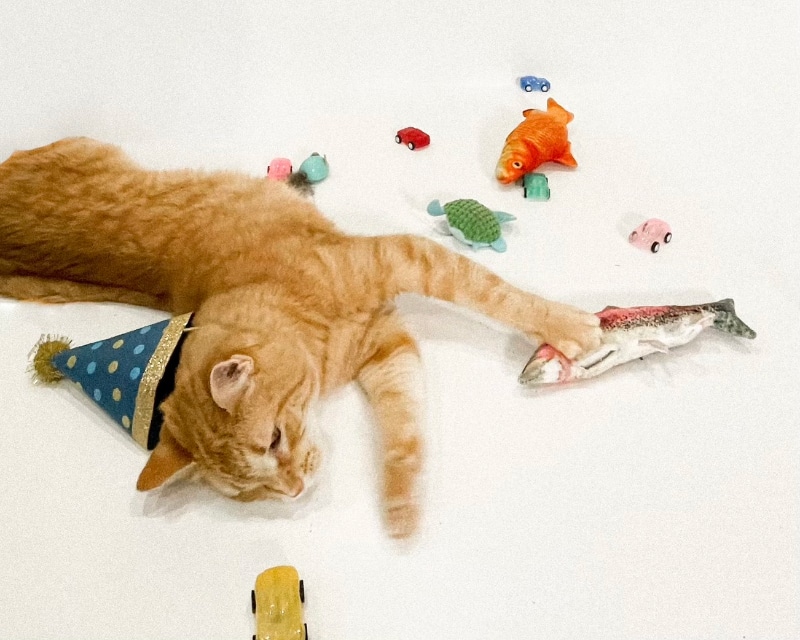Photos can capture precious memories of your cat, but it can be challenging to take clear photos of them. Most cats don’t have the patience for sitting around and posing and often lose interest quite quickly.
Even if you don’t have the most cooperative cat, you can still learn to take some good photos of them. It’s all about working with your cat and learning to spot opportune moments to take pictures of them. With a little practice and patience, you’ll be able to have a collection of amazing photos of your cat.
Before You Start
Fortunately, you don’t need fancy cameras or expensive photography equipment to take beautiful photos of your cat. Many phones these days have powerful cameras that can take high-quality shots. So, make sure to familiarize yourself with your phone’s camera features. You can play around with exposure and zoom settings. Some phone cameras also have portrait modes that will automatically focus on one subject and blur the background.
It’s also helpful to have your cat get used to your camera. Then, they’ll be less likely to run away or react when you take your camera out. You can teach your cat to become comfortable around your camera by building a positive association with your camera. Start by giving your cat a treat every time you take out your camera. Eventually, your cat will learn that they’ll receive a reward every time they see you pull out your camera. This will be extremely helpful when you try to get your cat close to the camera or try to do cat close-ups.
The 7 Tips to Take Amazing Photos of Your Cats:
1. Always Have Your Camera Ready

It’s rare for cats to be enthusiastic about photoshoots, so your best bet is to just always have your phone camera ready. You never know when your cat will do something cute. Making it a habit to have your phone camera near you will increase your chances of quickly getting your camera and snapping a few photos before your cat decides to move on to doing something else.
2. Take Multiple Shots

Always snap multiple photos of your cat. It may seem excessive, but it’s rare for cats to sit still for a picture. Taking multiple shots will increase the chances of capturing a non-blurry photo of your cat. You can also get a ton of cute candid shots of your cat, and it’s always nice to capture an unexpectedly lovely photo of your cat.
3. Place Cozy Resting Spots Near Windows

Natural lighting always makes photos of cats look nicer. So, try to place cozy mats or perches near your windows. This will increase the chances of getting your cat to pose unintentionally in spots with beautiful backgrounds and good lighting.
If you notice that your cat likes to rest at a particular spot, try adding a few plants or other decorations to the area. This will create a pretty backdrop and set for your photos. Strategically placing these types of sets near windows will also help you take advantage of golden hour, and you can end up taking really stunning photos of your cat.
4. Take Pictures of Your Cat Doing Their Favorite Things

If it’s difficult to get shots of your cat posing, you may find it easier to take photos of your cat when they’re engaging in their favorite activities. You can capture plenty of cute and endearing moments of your cat eating or playing with their favorite toy. Taking photos when your cat’s napping or sunbathing also usually produces adorable and heartwarming snapshots. Taking these types of natural shots rather than forced shots will make photo-taking a much more pleasant and stress-free experience for both you and your cat.
5. Use Lots of Treats

If your cat is food-motivated, you may be able to get your cat to cooperate by using treats. It’s often helpful to reserve special treats that your cat can eat only when you’re taking photos. This will help them stay interested for longer and reduce the likelihood of them running away.
6. Train Your Cat to Sit on Command

Sitting on command is one of the easier tricks that you can teach your cat, and it can buy you more time as you take photos of your cat. Once your cat learns to sit on command consistently, you can extend the amount of time they have to sit before they get their reward. This will increase the chances of your cat staying still for a photo before they turn their head or decide to walk away.
7. Enlist the Help of a Friend

When it comes to formal pet photography, it’s extremely helpful to have an extra set of hands. Whenever I have to take a staged picture of my cat, I usually enlist the help of a friend. One person will feed my cats treats or do something to catch their attention while the other snaps a bunch of photos. This method has seen the most success, and it keeps both cats and humans happy. The cats will be satisfied with eating treats, while the humans will be happy with their photos.
Conclusion
You don’t need expensive photography equipment to take amazing photos of your cat. The trick to taking good photos is to focus on your technique and identify opportune moments to take photos of your cat. As your cat gets used to being in front of the camera, you’ll find that taking nice photos of them becomes easier and faster. So, make sure to invest plenty of time in practicing and learning to find the best times to take photos of your cat. You’ll be sure to end up with an album filled with beautiful cat photos.
All images by the author.
Contents
- Before You Start
- The 7 Tips to Take Amazing Photos of Your Cats:
- 1. Always Have Your Camera Ready
- 2. Take Multiple Shots
- 3. Place Cozy Resting Spots Near Windows
- 4. Take Pictures of Your Cat Doing Their Favorite Things
- 5. Use Lots of Treats
- 6. Train Your Cat to Sit on Command
- 7. Enlist the Help of a Friend
- Conclusion










